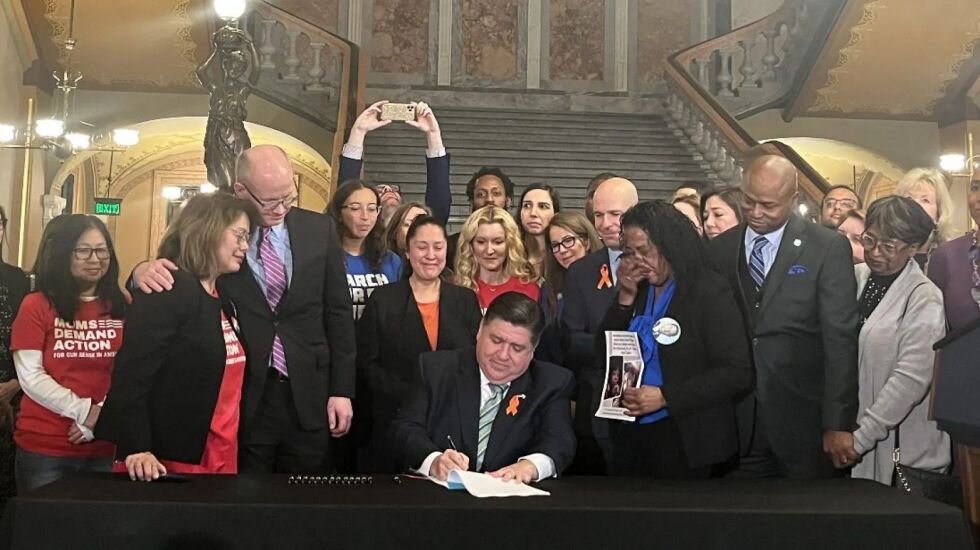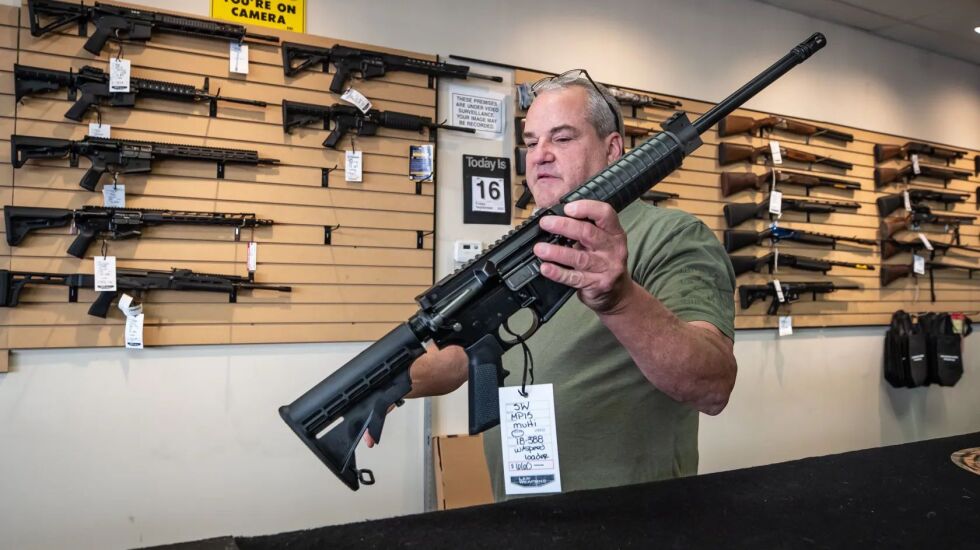
A federal judge in southern Illinois temporarily blocked enforcement of Illinois’ months-old assault weapons ban Friday, saying the law not only restricts the right to defend oneself but, in some cases, “completely obliterated that right.”
In a 29-page ruling granting a preliminary injunction in a set of consolidated lawsuits, U.S. District Judge Stephen McGlynn questioned whether “the senseless crimes of a relative few” can “be so despicable to justify the infringement of the constitutional rights of law-abiding individuals in hopes that such crimes will then abate or, at least, not be as horrific?
“The simple answer” at this stage in the litigation, the judge wrote, “is ‘likely no.’ ”
Illinois’ assault weapons ban was enacted in January in response to the mass shooting at Highland Park’s Fourth of July parade that left seven people dead.
McGlynn said his ruling is “not a final resolution” and that “nothing in this order prevents the state from confronting firearm-related violence” through “a wide array” of other laws.
“Law enforcement and prosecutors should take their obligations to enforce these laws seriously,” McGlynn wrote. “Families and the public at large should report concerning behavior. Judges should exercise their prudent judgment in committing individuals that pose a threat to the public and imposing sentences that punish, not just lightly inconvenience, those guilty of firearm-related crimes.”
Gov. J.B. Pritzker’s office did not respond to a message seeking comment.
McGlynn’s ruling comes after requests to block Illinois’ assault weapons ban have been denied by two federal judges in Chicago and the 7th U.S. Circuit Court of Appeals. Those denials came despite a U.S. Supreme Court ruling last summer that found gun regulations must be “consistent with the nation’s historical tradition of firearm regulation.”
U.S. District Judge Virginia Kendall in Chicago denied a motion last February that sought a temporary restraining order and preliminary injunction against the state ban. She found that Illinois’ law and a similar Naperville ordinance were “constitutionally sound” and wrote that “because assault weapons are particularly dangerous weapons and high-capacity magazines are particularly dangerous weapon accessories, their regulation accords with history and tradition.”
The federal appellate court then declined to issue an injunction against the state law while Kendall’s ruling against Robert Bevis, a Naperville gun-shop owner, was appealed.
Earlier this week, U.S. District Judge Lindsay Jenkins issued a ruling that echoed Kendall’s.

An appeal of McGlynn’s ruling would head to the same appellate court as Kendall’s.
McGlynn rejected arguments that Illinois’ law is consistent with historical tradition. He said one argument — that large-capacity magazines and assault weapons were not “in common use when the Second and Fourteenth Amendments were ratified” — was “bordering on the frivolous” because the Second Amendment extends to arms not in existence at the time.
He also called “misplaced” an argument that the law restricts weapons and accessories “not commonly used for self-defense.”
McGlynn wrote that last summer’s Supreme Court ruling in the case New York State Rifle & Pistol Association v. Bruen “clearly holds that the Second Amendment protects ‘possession and use’ of weapons ‘in common use’ not just weapons in common use for self-defense.”
“The AR-15 style rifles are among the most popular arms produced ‘account[ing] for nearly half of the rifles produced in 2018 and nearly 20% of all firearms of any type sold in 2020,’ ” the judge wrote.
Illinois’ law bans the sale of assault weapons and caps the purchase of magazines at 10 rounds for long guns and 15 for handguns. It also makes rapid-fire devices known as switches illegal because they turn firearms into fully automatic weapons.
Under the law, anyone who already owns the banned guns is allowed to keep them but required to register them with the Illinois State Police by Jan. 1.
McGlynn has now stopped enforcement of that law until the consolidated lawsuits pending before him are resolved.







